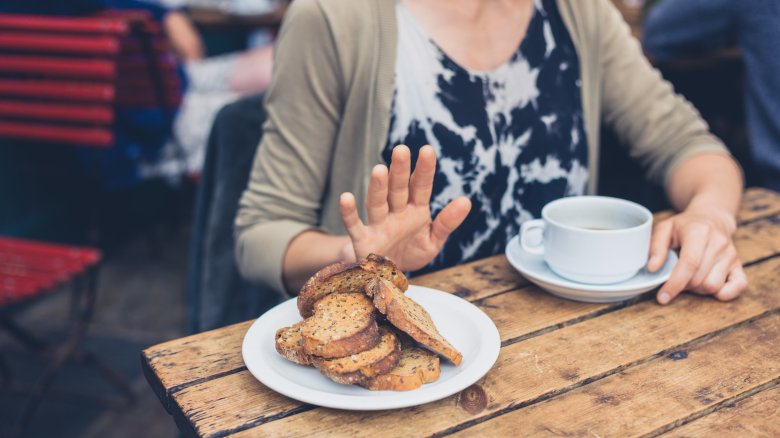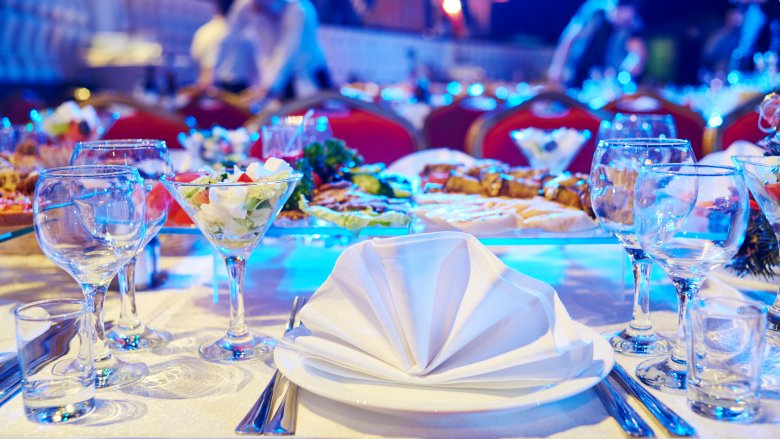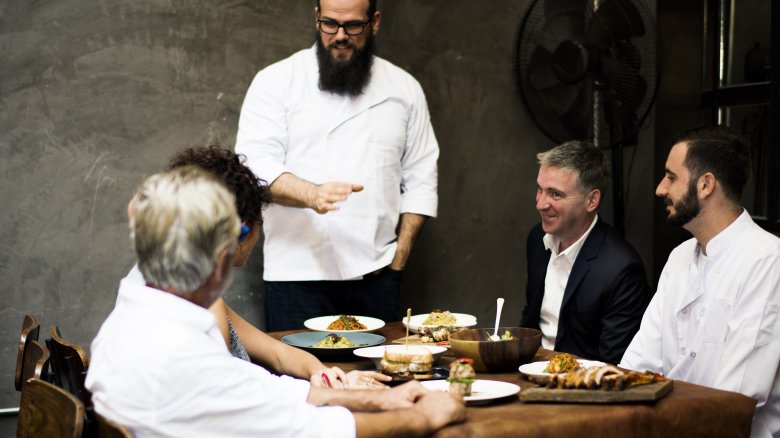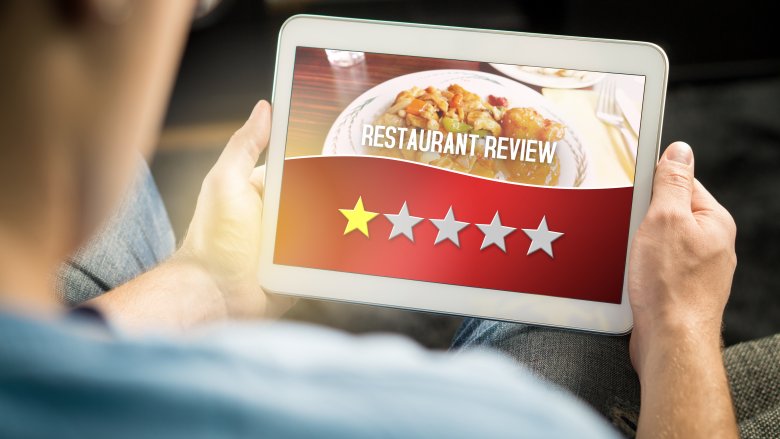Things Customers Do That Annoy Chefs
When you go out to eat, you expect certain things from the staff. You expect a pleasant experience, nice interactions, good service, and good food. Right? Well, let's flip that around. Every time customers walk in, the chef, kitchen, and wait staff are hoping they're not the kind that will ruin the entire day. Let's talk about some of the things customers do — sometimes unknowingly — that make a chef's life more difficult.
Ordering a custom birthday cake... when they sit down
Kirk O'Neill has been a chef for more than 30 years, and says this one happens more than you'd expect. Even if the party has made reservations, it's not uncommon for the group's spokesperson to add on a, "By the way..." as they're being seated, and then request a custom, time-consuming birthday cake. If you've ever baked a cake at home, you know the effort that goes into the stuff out of the box — making one from scratch when the customers walk in and sit down just isn't going to happen.
Fawn Pfohl agrees. She's a chef at The Bee & The Biscuit, and she has a ton of experience in desserts, pastries, and cakes. She says the perfect scenario is the simplest one: order your specialty cakes in advance, and then don't cancel them the day before the event. Why? Chances are pretty good part of your cake and decorations have already been made. "Then, you've just wasted our time and as a cake decorator, we can't waste time. Time management and using every single minute appropriately is key to our job, and cancellations like these are devastating to our schedules."
Presenting preferences as allergies
A huge part of a chef's job isn't just making food, it's keeping the kitchen safe. That's extra-important when it comes to people who have legitimate food allergies, so they hate it when a customer presents a dislike as a medical allergy. And most of the time, they see through it.
One veteran chef of 35 years (who asked to remain anonymous) had a ton of stories of people doing exactly that, like one customer who told him she had a severe allergy to tomatoes, and none of her food could touch them. Later, when she ordered a quesadilla with extra salsa, he pointed out they were the same tomatoes they'd kept separate from her other food. "Oh," she answered, "I'm not allergic to them when they're in salsa." The incident was years ago, and he still remembers it vividly.
It's frustrating to all of the kitchen staff, and in the end, it's only hurting the people who have valid allergies. Fake allergies make it impossible for the chef to tell who's legitimately at risk, and that's not just being a bad guest, that's being a bad person.
Add seasoning before tasting
Peter Hiscott is a chef at Divine Dishes Catering, and he spoke up about something that never fails to annoy him. "Adding salt and pepper to your food before tasting it," he says.
Chefs don't just warm up food and put it on a plate, they spend countless hours experimenting with seasoning to get a profile just right. When they see a dish put in front of a guest then immediately covered with salt, pepper, ketchup, BBQ sauce, or any other condiment, it's not just annoying, it's insulting. Taste first, and you might be surprised at how good it is right out of the kitchen, without your additions.
Modifying the specials
Almost any restaurant will have a few special things on the menu on any given night, and they're called specials for a reason: they're special. According to chef-turned-manager Dave Lenweaver, one way to get under the chef's skin is to order a special, then ask for all kinds of modifications.
"Specials are the specials," he says. "The kitchen preps just so many for each night, and changing the order just slows everything down."
Sometimes, some of the specials are prepped to just about finished in the minutes leading up to the dinner rush. It's one way they help themselves get your food out in a timely manner, and asking them to re-make or change something major can cause big delays. You're hungry, everyone else is hungry... so don't slow things down!
Are you REALLY out of that?
It's disappointing when you have your heart set on a particular dish, only to find out the restaurant is out of a key ingredient. Disappointing, of course, but do you know what's really annoying? If you ask your server to double-check, just to make sure.
"When someone says they've run out of something, it's gone," says chef Fawn Pfohl. "We're not lying about it, and we're not trying to be funny, and if we have something in stock, we want to make it for you. We know exactly how much we have of everything."
They know their stock and the contents of their fridges better than you know what's in yours, that's for sure, and they absolutely want to sell what they have on hand. If they say they're out, they're telling the truth.
Delaying placing an order
Everyone has probably done this at one time or another. Your server comes to take your order, and you ask for a few more minutes. You're still not entirely sure when your server comes back, so you ask for a few more. It seems harmless, but it's annoying the heck out of the chef.
Dave Lenweaver started out in the kitchen before moving to management, so he's familiar with every part of the domino effect a stalling table can have. When customers are seated, the hostess does it so orders are staggered when they reach the kitchen, but if one table stalls, it throws the whole rhythm off.
"It can make or break your night," Lenweaver says. "Guests need to remember that a restaurant is a fine-tuned ballet of taking, making, then serving the order. Timing is everything. [When people delay,] it disrupts the flow, everyone suffers, and it can even slow other guests' meals to a crawl." Then, those other guests can blame servers and the chef, when they're just trying to make extreme adjustments on the fly.
Rudeness and taking service for granted
Maria Kuehn is the award-winning chef at the helm of The Lounge Cafe in Wembley, a little place on the outskirts of London. She knows how tough the business is, and how far good customer service goes in keeping your reviews good and your doors open. She says that while she'll bend over backwards to accommodate customers and their requests, courtesy from guests goes a long way.
"Rude customers are always a challenge," she says. "I'm there to serve my customers, but I'm not a servant. No one wants a grouchy person serving them, right? It goes both ways."
This is a big one, and chef Fawn Pfohl agrees. "People feed off the emotions and attitude of others," she says. "You bring your bad juju into my restaurant, and everyone's going to feel it." It's a domino effect: customers are rude to the hostess and the servers, the servers get frustrated with the way they're being talked to, and that makes it back into the kitchen. Bottom line? Be nice.
Changing a dish, then getting mad
Sure, everyone has their likes and dislikes, but most menus will have something on them you'll like without making major changes. One anonymous chef says that customers should remember each dish has been carefully crafted, and it's served that way for a reason. Asking for major modifications is going to change the dish, and it might not taste good anymore — which the customer will eventually discover.
"Don't complain about something that's not at all what I designed," he says. "Every choice that's made in the kitchen is made for a reason... When it tastes bad, customers think that's still on us. It's not, not when they ask for something completely different than what we put so much time into perfecting."
Your best bet? If there's something major in a dish you know you're not going to like, just order something else. They're the professionals for a reason.
Asking for things that don't exist
This seems like a no-brainer, but chef Fawn Pfohl says it happens all the time.
She says one of the most frustrating things she has to do is explain why something just can't be done. These are the orders that request something like a wheat wrap with all the gluten removed, cheese-covered nachos (but vegan), or a peanut butter ice cream that's safe for someone with peanut allergies. She says there's not a lot that's more frustrating than having to leave the kitchen — and stop preparing orders for other customers — because a guest is insisting on something that doesn't even exist. There's a lot of magic that happens in a restaurant's kitchen, but making the impossible happen isn't part of it.
Making last-minute changes to reservations
Amanda Dobbs is a caterer, and says one of the things that never fails to annoy her is when a customer schedules an event, lays out a menu... and then changes things a day before go-time.
It might seem small to the customer, but it's a logistical nightmare for the chef. Dobbs says most of her vendors require orders to be placed at least 24 to 48 hours before it's going to be delivered, and while a customer might think they can just pick up the phone and add another 10 people onto their total, it's not that easy for the chef. Any and all changes impact orders, suppliers, the time allotted to preparing each dish, and even the staff they need.
Dobbs says she's also had customers reserve her catering services for a certain number of guests, then had a dozen or so extra people show up. She was expected to accommodate and feed those people for free, and there's nothing more disheartening than having you and your business so disrespected. Be honest, be straightforward, and don't make changes.
The last minute customer
Anyone who's worked in retail knows how annoying this can be, so imagine if you're not just waiting for a customer to shop. Imagine you've just worked a 16-hour day, you're looking forward to finally getting a meal of your own, sitting down for the first time in hours, and closing your eyes... when someone comes in and suddenly, you know your day just got a few hours longer. There's no reason you shouldn't be able to plan ahead and make it to the restaurant in plenty of time... or find a place that's open later.
Chef Fawn Pfohl says there's a subset of this kind of bad customer that's even worse. They're the ones that sneak in a few minutes before the doors close... and then ask their meal be discounted or free, because clearly, this food wasn't going to get sold and was just going to be thrown away anyway. "They're making us stay there later, they're making wait staff stay, they're making clean-up take longer, and they're raising our expenses and overhead for the day... then asking for free meals on top of it. Not cool, man, not cool at all."
Not communicating clearly
In addition to running The Lounge Cafe in Wembley, chef Maria Kuehn also writes and runs the food blog Minding Bellies Well. A big focus of her work online and in the kitchen is trying to get people to expand their eating habits, try something new, and better yet, share those experiences with their loved ones. That background has helped give her a ton of experience, but in order for her to do the best she can, she says customers need to communicate clearly.
No matter how good the chef is, the only one who really, truly knows what they want on their plate is the customer. Ordering, say, a burger then sending it back because they forgot to mention they also wanted it cut in half isn't just annoying, it's a waste of time for the chef and servers. Kuehn says that communication is a huge part of her job, and that also means that customers need to listen to what the chef or server is telling them. It takes two to communicate!
Eating and complaining
Working as a professional chef isn't easy, and most of those who do it chose that career path because food is something they're passionate about. They want to be able to share that with others, and they want every single guest walking out of their restaurant feeling like they were part of an experience, not just the biological function of eating. That's the main reason behind chef Fawn Pfohl's pet peeve: a customer who polishes off all the food on their plate, then tells the server there was something wrong or it wasn't good.
"I'm always baffled," she says. "If there's something wrong, I want to know about it. I don't want anyone walking out feeling dissatisfied, that's not what we're here for. I want everything perfect."
Crowdsourcing bad reviews
We live in an era where social media can make or break a business, no matter what it is. The Bee & The Biscuit chef Fawn Pfohl says they don't just respond to the good reviews they get on TripAdvisor, but they also try to fix any problems customers might have. That's just good business!
What no business can fix is when customers decide to crowdsource bad reviews. She says it's common across all restaurants, and it can happen for reasons that might not have anything to do with the restaurant, service, or food at all. In today's world, it just takes a single customer — or former employee — to ask their friends and family to hop online and give a place a bad review and suddenly, it looks like a bad place to eat. That ultimately means some of those negative reviews that keep you from visiting a place are nothing more than what she calls "spite grading," and it can do some serious damage — and really irk the chef on the receiving end of the fake reviews.
Ordering things not on the menu
Karen Moran is the baker and chef behind both Sweet Lulu's Bakery and Sweet Lulu's Cocktail Caravan. Her gripe is something that's made even more frustrating by the fact it's a pitfall that's incredibly easy for customers to avoid.
"Ordering things we don't have," she says. "Customers constantly order flavors we don't carry, and even request delivery to an area we clearly note we don't deliver to."
Order what's on the menu; if there's nothing you like, go someplace else.














